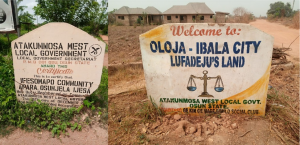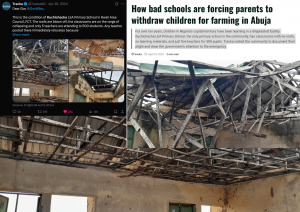The Jisomosun/Lujomu comprehensive high school sited in a community within Ondo West was an eyesore, in a deplorable condition despite the N15 million budgetary provision until BudgIT Tracka intervened.

BudgIT’s first visit to the school and it is apparent how the environment blights both students and teachers in the school. Most pupils have dropped out of school as the learning conditions became tougher by the day. With only four blocks, the entire school has three blocks of the classrooms, and the last block serves as the administrative block with four rooms which boards staff of the school. Mid-June 2016, BudgIT Project tracking officer visited the community for the first time to observe the implementation of the Lujomu school renovation, one of the FG 2016 zonal intervention projects in Ondo State; it costs N15 million.The PTO held a meeting with the school administrators to inform them about provision and encourage them to follow up on the project to ensure the school is revamped. BudgIT Officer shared printed simplified budget documents and names and contact details of the state’s representatives at the National Assembly to foster engagements.
Subsequently, BudgIT revisited the school and held meetings with the Parent/Teacher’s Association and the School personnel to discuss civic education and the importance of being involved in governance to make public officials accountable. This meeting propelled the school head to engage the Ondo East/West Representative, Hon. Akinlaja via letter to inform him about the poor condition of Lujomu School and ask what he can do in his capacity to ensure the renovation project is accomplished.
We observed ongoing work at the school by March 2017 and continued to monitor the project closely to ensure execution as specified in the budget. Although the budget line item states the renovation of one block of six classrooms with Headmaster’s office at Jisomosun/Lujomu comprehensive high school, only four classrooms were renovated. BudgIT Officer approached the site Engineer working on the project, who attributed the shortfall to insufficient funding from the ministry.

Shockingly, this project is not only under implemented but also poorly executed. Barely three months after the renovation work was completed on the four classrooms, the most disheartening consequence of subpar governance is seen as one of the two old classrooms caved in disrupting school activities, luckily no one was injured in the horrifying accident.

However, it led to several questions concerning the quality of the products used for the renovation, how much was released by the Ministry of Education and who should be held responsible for reducing the numbers of classrooms built? This developmental setback should be a wake-up call on the devastating effects of poor governance, and citizens must exert their rights to demand excellence in the execution of public projects around them.


